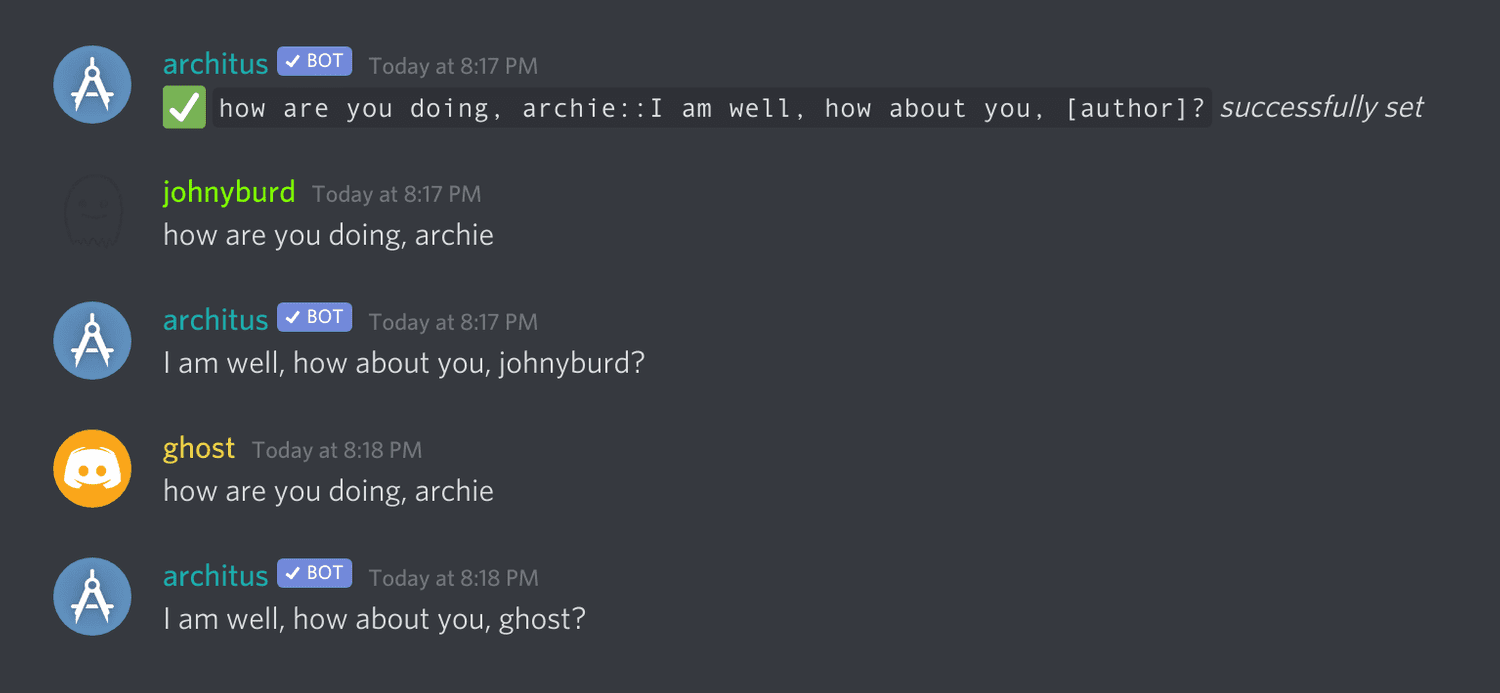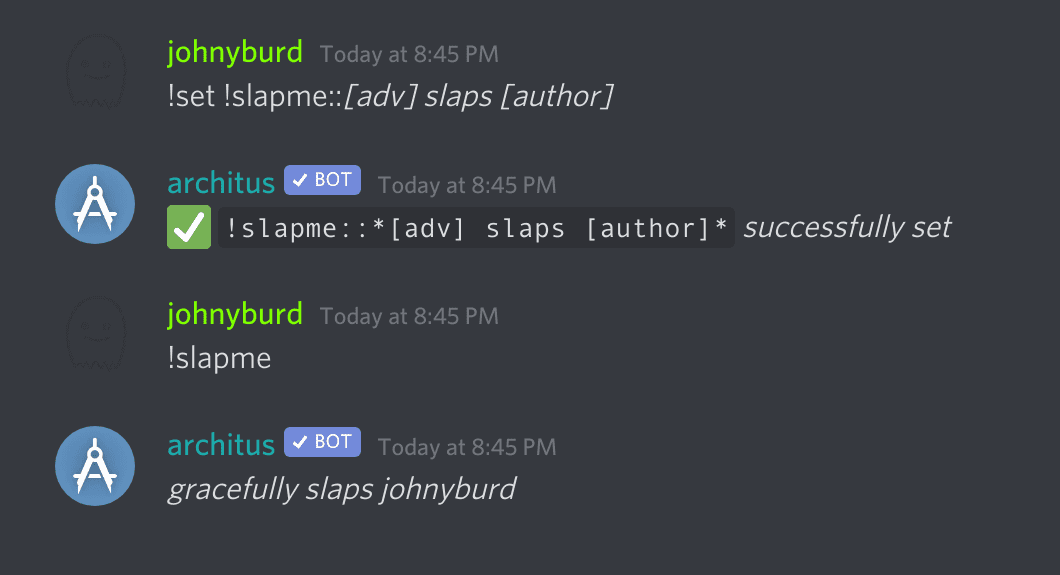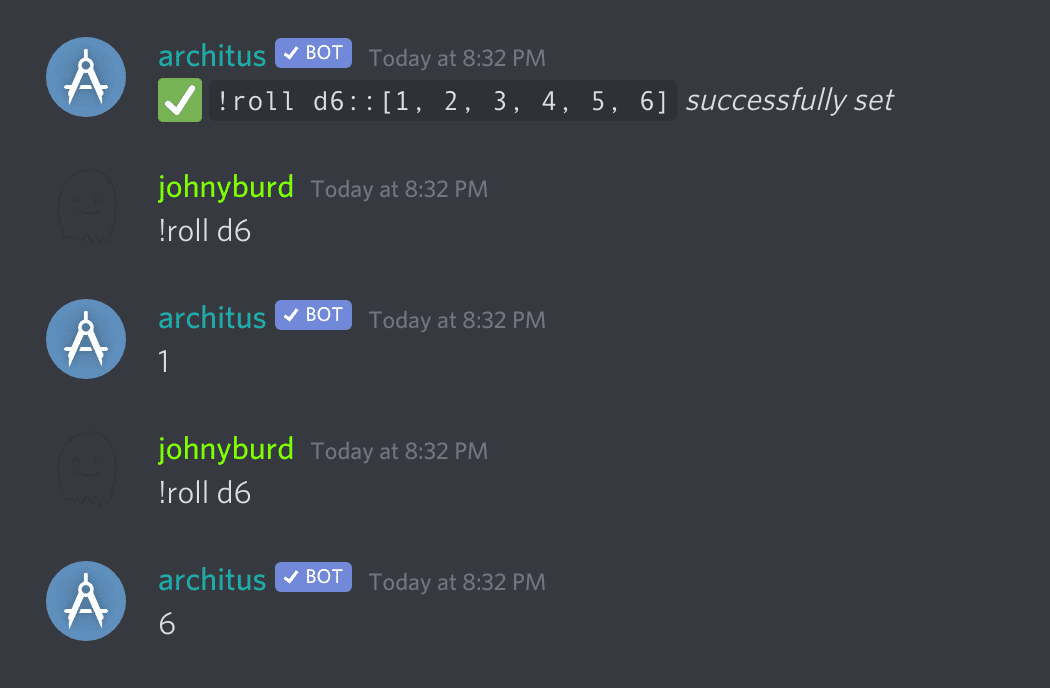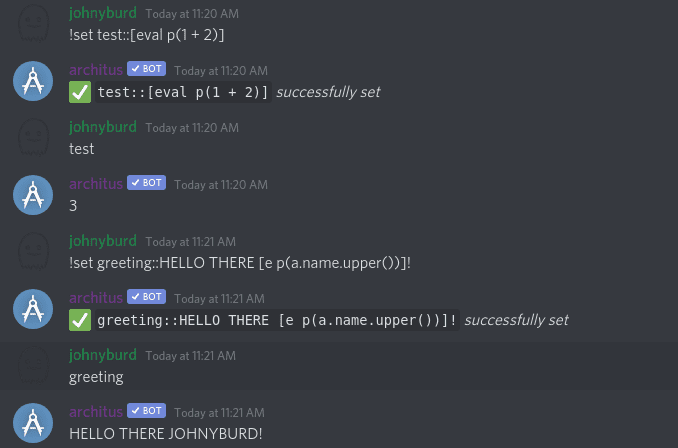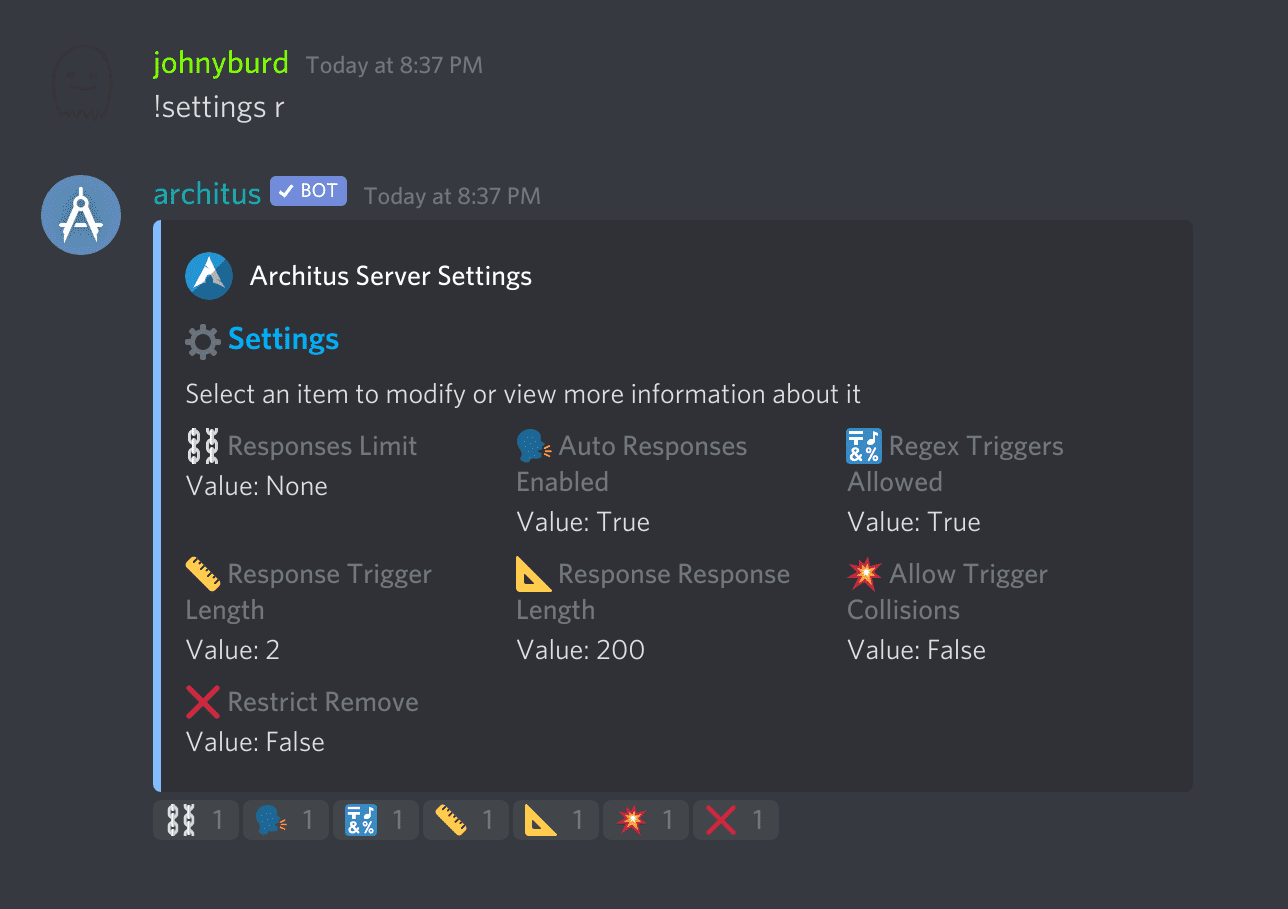Auto responses allow users to configure architus to listen for and respond to message patterns using an extensive syntax explained below.
Note: examples use the ! command prefix but this may vary by server
Setting Auto Responses
!set <trigger>::<response>
architus will respond with <response> when <trigger> is sent in a text channel.
Removing Auto Responses
Auto responses may be removed from within the discord client via the remove command.
!remove <trigger>
The trigger must exactly match the original trigger used to set the auto response. If you are unsure of the original trigger, you may react with the info reaction on the response message to find it. Alternatively, the web dashboard provides an interface for viewing and filtering auto responses in your servers.
Info Reaction
As a way to mitigate potential confusion and annoyance stemming from the auto response system, architus provides a way to easily identify the source of automatically triggered messages: you may react with a 💬 (:speech_balloon:) to view the exact syntax and author of the auto response.
Response Substitutions
responses set on architus may include any number of special tokens which will be substituted with a special value when the response is triggered.
[author]
substituted with the name of the user that triggered the auto response
[noun], [adj], and [adv]
substituted with a random noun, adjective, or adverb, respectively
[count]
substituted with the number of times the auto response has been triggered
[member]
substituted with the name of a random member of the server
[:emoji:]
not rendered in the response, but instead architus will react to the trigger message with the specified emoji
[option 1, option 2, option 3]
substituted with one of the options. The options are seperated by commas.
[0], [1], [2], …
substituted with the captured text taken from the trigger message.
[eval script]
substituted with whatever is printed from the the starlark script that comes after the eval. Can also use e as a shorthand for eval.
See here for more information on what can go into a script and how to write them.
Errors
If architus is unable to parse your response, it will display an error along with the position of the character that confused it.
Tip: If you are trying to use unmatched []s, try escaping with a backslash \
Trigger Punctuation & Whitespace
Punctuation
Basic text only triggers will not take punctuation into account. Triggers that include punctuation will take into account only the punctuation characters used in the trigger.
For example, for the response how are you::I'm good, architus will respond I'm good to both how are you and how are you?.
Conversely, with !roll d4::[1,2,3,4], architus will pick a number for !roll d4 and not for roll d4.
Whitespace
Whitespace in triggers is always matched literally. This differs from previous versions in which it was ignored.
Note: for advanced handling of punctuation and whitespace, consider using regex triggers.
Regex Triggers
Regexes or regular exressions are a standard language for matching patterns of strings. Regex triggers allow you to program architus to respond to patterns in messages rather than word-for-word phrases. They also allow capturing content from the trigger message to be used in the response.
Note: Regex Triggers do not make any automatic adjustments to punctuation matching.
Setting a Regex Trigger
To set a regex trigger, ensure that your trigger begins with ^ and ends with $.
e.g. !set ^test$::hi
Common Syntax
Regular expressions are complex and the reader would be better served learning them elsewhere, but here is a short reference of common patterns that architus supports
Expressions
| Pattern | Description |
|---|---|
. | matches any character |
[xyz] | matches x, y, or z |
[^xyz] | matches any character except x, y, and z |
x|y | x or y (prefer x) |
x* | zero or more x, prefer more |
x+ | one or more x, prefer more |
x? | zero or one x, prefer one |
x{n,m} | n or n+1 or … or m x, prefer more |
x{n,} | n or more x, prefer more |
x{n} | exactly n x |
(re) | numbered capturing group (submatch) |
\d | digits (≡ [0-9]) |
\s | whitespace (≡ [\t\n\f\r ]) |
\w | word characters (≡ [0-9A-Za-z_]) |
Capture Groups
When a trigger regex that contains capturing groups is matched, the captured content can be used in the response via the response syntax
!set ^should I (.+) or (.+)$::I think you should [[0], [1]]
Wildcard (*)
Older users might be familiar with using * as a ‘wildcard’ to capture anything in the trigger. That syntax has been deprecated in favor of the much more powerful regex language. Below are a few examples of how one may accomplish the same things with the new system.
Comparison
| old | new (exactly) | new (better) |
|---|---|---|
!set no*u::no no [capture]u | !set ^no (.*)u$::no no [0]u | !set ^((no )+)u$::no [0]u |
!set https://www.facebook.com/*::😂😂😂 | !set ^https://www\.facebook\.com/.*::😂😂😂 | !set ^https://(www\.)?facebook\.com/[\w/=?]+$::😂😂😂 |
!set !ban *::🔨 banned [capture] 🔨 | !set ^!ban (.*)$::🔨 banned [0] 🔨 | !set ^!ban (<@!\d+>)$::🔨 banned [0] 🔨 |
Generally speaking, if you are not interested in learning the intricacies of the regex system, replace the old * with (.*) and the old [capture] with [0].
Errors
In the event that architus is unable to parse your trigger regex, it will give an error message along with a number indicating the position (after the ^ and starting at 0) of the error.
Non-admin users will not be able to set regex triggers unless they are allowed in settings
Eval
Architus uses the starlark language as its scripting language for auto-responses. A detailed specification of everything you can do in the language can be found here.
Starlark is a stripped down dialect of Python. This means that most simple Python scripts will produce the exact same behavior in Starlark.
Usage
Anything printed in the script will appear in the response content.
To print from starlark, the standard print function can be called. In addition, eval accepts a shorthand, p, to decrease the length of user scripts.
Starlark has some peculiarities about it that make it more difficult to use when coming from Python. For example, strings are not iterable in Starlark, only lists. To iterate over a string you must call the elems method on it:
print([a for a in "aoua".elems()]) # prints: ["a", "o", "u", "a"]Builtin Functions
The architus implementation of Starlark adds in a few extra builtins to improve user experience. They are called the same as any other Python builtin with the same behavior.
Random
The random function can be called with no arguments to return a random float in the range [0,1):
print(random()) # ex: 0.686645146372598Randint
The randint function can be called with a high and low parameter to return a random integer in that range. For instance, randint(lo, hi) will return an integer in the range [lo, hi).
Choice
The choice function will return a random element from a list. It accepts a single list element as an argument and its return type can be any of the types in the list:
print(choice(["hello", 'a', 1, 1.2345, randint])) # ex: helloSine
The sin function is the standard trigonometric sine function. It accepts radians as an argument and will return a float in the range [0, 1].
Sum
The sum function will sum all of the elements in a list. The sum will always start at zero and all of the elements of the list must be a number:
nums = range(1,101)
values = [1,1.5,3,4.5]
assert(sum(nums) == 5050)
assert(sum(values) == 10.0)Global Variables
Architus adds several global variables to the script environment to allow users to access information about the message, author, and channel that triggered the auto-response:
Some global variables are objects. To access the name member of an author you can just use author.name.
message
| Member name | Type | Description |
|---|---|---|
| id | integer | Discord id of the message |
| content | string | Raw content of the message |
| clean | string | Clean content of the message |
author
| Member name | Type | Description |
|---|---|---|
| id | integer | Discord id of author |
| avatar_url | string | Url for author’s avatar |
| color | string | The color the author’s name is displayed as |
| discrim | integer | The discriminator part of the author’s username |
| roles | list of integers | Contains the discord ids for each role the author is in |
| name | string | Author’s username with no discriminator |
| nick | string | Author’s nickname in the server |
| disp | string | Author’s display name in the server |
channel
| Member name | Type | Description |
|---|---|---|
| id | integer | Discord id of the channel |
| name | string | Name of the channel |
count
The number of times this auto response has been triggered.
caps
An array of strings that contain all of the capture groups defined in the regular expression trigger of the auto response.
Settings
The auto response settings pane can be accessed by the settings responses command
Options
| name | type | description |
|---|---|---|
| Responses Limit | int? | the number of responses that each user can have set in the server |
| Auto Responses Enabled | bool | prevents setting new responses or triggering existing ones |
| Regex Triggers Allowed | bool | whether triggers that use regexes may be set |
| Response Trigger Length | int | the minimum length of triggers that users may set |
| Response Response Length | int | the maximum length of responses that users may set |
| Allow Trigger Collisions | bool | whether setting triggers that overshaddow each other is allowed |
| Restrict Remove | bool | whether anyone may remove an auto response or just the author |
| Allow Embeds | bool | If false, architus will escape links in an auto response to prevent discord from embedding them |
| Allow Newlines | bool | Toggles whether or not architus will strip new lines in auto response outputs |
Note: most of these restrictions do not apply to admininstrators



